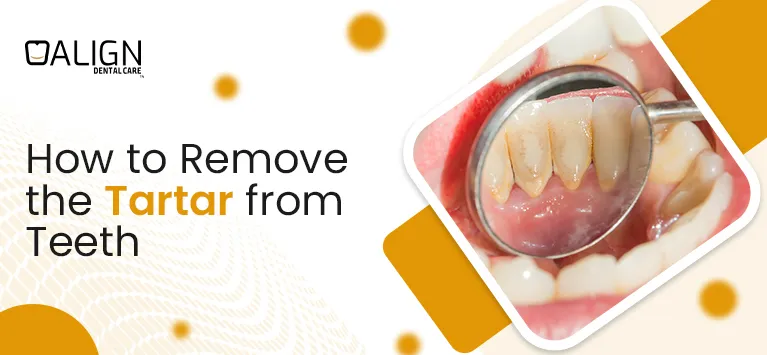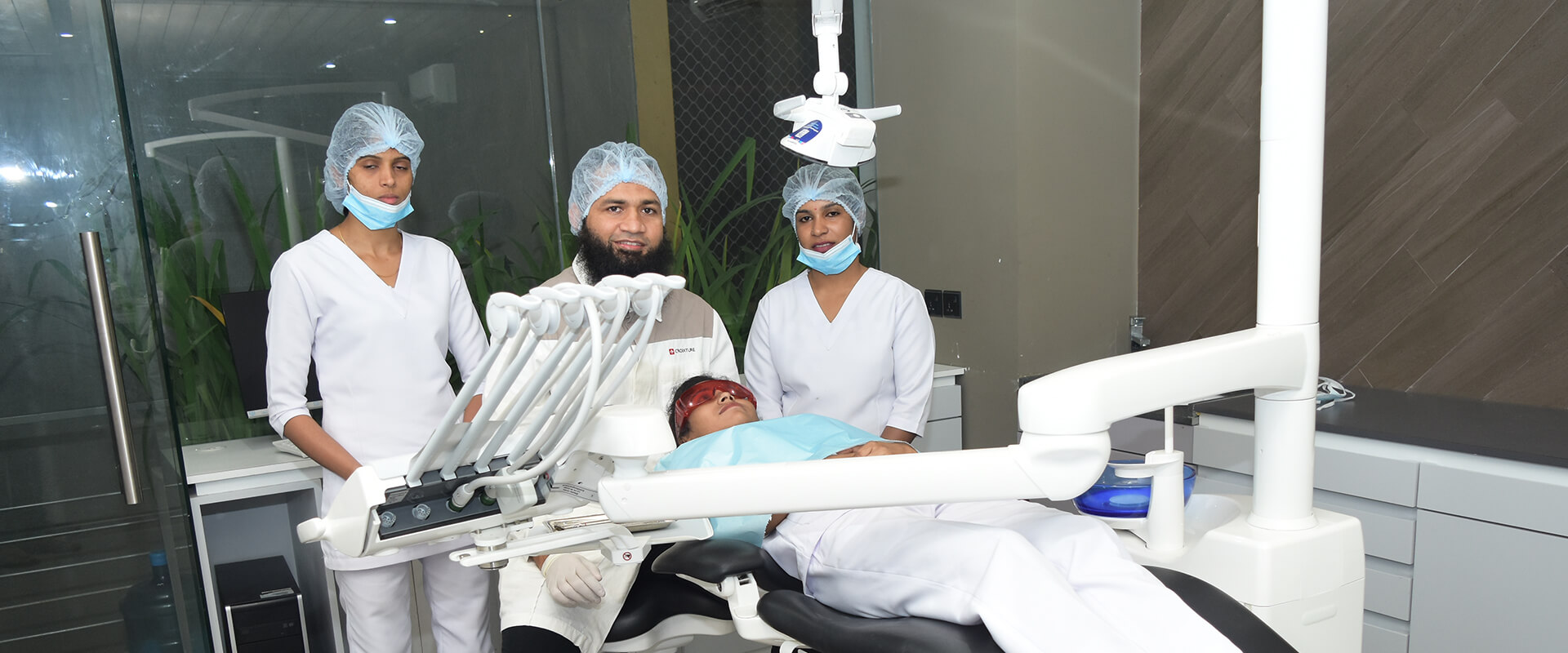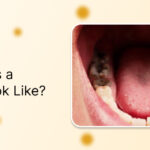How to Remove the Tartar from Teeth

Tartar buildup on teeth is a common issue that can lead to oral health problems like cavities, gum disease, and bad breath. Removing tartar on teeth not only improves the appearance of teeth but also supports overall dental hygiene. This guide will provide practical methods for tartar removal, including professional treatments and home remedies. Whether looking for preventative tips or ways to address existing tartar on teeth, this guide covers everything you need to know about maintaining a bright and healthy smile.
What is Tartar on Teeth?
Tartar, or dental calculus, is a hardened dental plaque. When plaque is not removed from teeth through brushing and flossing, it can calcify, turning into tartar. Unlike plaque, tartar cannot be removed by regular brushing and requires professional cleaning or specialized tools to eliminate.
Key Characteristics of Tartar
Colour: Tartar on teeth can be yellow or brown.
Location: It typically forms along the gumline and between teeth.
Texture: It is hard and rough, making it easy for more plaque to adhere.
Importance of Removing Tartar
Removing tartar is crucial because it contributes to:
Gum Disease: Tartar buildup can irritate the gums, leading to inflammation and bleeding.
Cavities: It provides a breeding ground for bacteria, increasing the risk of tooth decay.
Bad Breath: Bacteria in tartar produce foul-smelling compounds and give bad breath throughout the day.
Professional Tartar Removal
Professional tartar removal is essential for maintaining oral health, especially when the buildup is significant.
Benefits of Professional Cleaning
- Thorough Removal: Dental professionals use specialized tools to remove tartar that brushing and flossing cannot reach.
- Prevention: Regular cleanings prevent the recurrence of tartar buildup.
- Assessment: Dentists can check for other dental issues during cleanings.
Methods Used by Dentists
- Scaling: This involves scraping tartar off the teeth using a metal tool called a scaler.
- Ultrasonic Instruments: These tools vibrate at high frequencies to break up tartar.
- Polishing: After tartar removal, teeth are polished to smooth the surfaces, making it harder for plaque to adhere.
How Often Should You Visit the Dentist?
- Routine Cleanings: Every six months is ideal for most people.
- High-Risk Individuals: Those prone to gum disease or tartar buildup may need more frequent visits.
Professional cleanings are the most effective way to remove tartar on teeth and prevent dental problems. Regular visits to the dentist help maintain oral health and catch issues early.
Home Remedies for Tartar Removal
While professional cleanings are crucial, home remedies can also help manage and reduce tartar. Effective home remedies are:
Brushing with Baking Soda
- How It Works: Baking soda is a mild abrasive that can help scrub away tartar.
- How to Use: Combine a bit of baking soda with water to create a paste. Brush your teeth with this paste once a week.
Using Hydrogen Peroxide
- How It Works: Hydrogen peroxide has antibacterial properties that can help reduce plaque and tartar.
- How to Use: Mix equal parts of hydrogen peroxide and water. Swish the mixture around your mouth for one minute and then rinse with water.
Oil Pulling
- How It Works: Oil pulling with coconut oil can help reduce plaque and tartar buildup.
- How to Use: Swish a tablespoon of coconut oil in your mouth for 10-15 minutes daily. Spit it out and follow up with a thorough water rinse.
White Vinegar
- How It Works: The acidic nature of white vinegar can help break down tartar on teeth.
- How to Use: Mix two tablespoons of white vinegar with a cup of warm water and a pinch of salt. Use this solution as a mouthwash once a day.
Home remedies can be effective for preventing and reducing tartar but should not replace professional cleanings. They are most beneficial when used alongside regular dental visits.
Best Practices for Preventing Tartar on Teeth
Preventing tartar buildup is easier than removing it. Adopting good oral hygiene habits can keep your teeth and gums healthy. Essential prevention tips are:
Brush Regularly
- Why It’s Important: Brushing removes plaque before it hardens into tartar.
- How to Do It: Brush twice a day with fluoride toothpaste for at least two minutes each time.
Floss Daily
- Why It’s Important: Flossing removes plaque from between teeth and along the gumline.
- How to Do It: Use a piece of floss about 18 inches long. Slide it between each tooth and curve it into a C shape against the tooth surface.
Use Mouthwash
- Why It’s Important: Mouthwash can kill bacteria that contribute to plaque formation.
- How to Do It: Use an antiseptic or antibacterial mouthwash daily.
Eat a Healthy Diet
- Why It’s Important: Sugary and starchy foods contribute to plaque buildup.
- How to Do It: Limit sugary snacks and drinks. Include a variety of fresh vegetables, fruits, and whole grains in your diet.
Avoid Tobacco Products
- Why It’s Important: Tobacco use can increase tartar buildup and gum disease risk.
- How to Do It: Seek help to quit smoking or using other tobacco products.
Preventing tartar requires a consistent oral hygiene routine and healthy lifestyle choices. Following these tips can help you maintain a tartar-free smile.
Natural Remedies for Tartar Control
Natural remedies can provide an additional layer of protection against tartar. They can be used in conjunction with traditional oral care practices. Natural remedies to consider are:
Aloe Vera
- Benefits: Aloe vera has antimicrobial properties that can help fight bacteria in the mouth.
- How to Use: Apply aloe vera gel to your teeth and gums. Leave it on for a few minutes, then rinse with water.
Clove Oil
- Benefits: Clove oil has antibacterial properties that can reduce plaque and tartar.
- How to Use: Mix a few drops of clove oil with a carrier oil like coconut oil. Apply the mixture to your teeth and gums using a cotton ball.
Orange Peels
- Benefits: The vitamin C in orange peels can help break down plaque.
- How to Use: Rub the inside of an orange peel directly onto your teeth and gums. Leave it on for a few minutes, then rinse with water.
Sesame Seeds
- Benefits: Chewing sesame seeds can help remove plaque and tartar.
- How to Use: Chew a handful of sesame seeds. Do not swallow them. Use a dry toothbrush to brush your teeth while the seeds remain in your mouth, then rinse.
Natural remedies offer additional support in controlling tartar. They are easy to incorporate into daily routines and complement other tartar prevention strategies.
Common Misconceptions About Tartar Removal
There are many myths about tartar removal. Understanding the facts empowers you to make informed choices regarding your oral health. Misconceptions and facts are:
“Brushing Harder Removes Tartar”
Fact: Brushing harder does not remove tartar and can damage gums and enamel. Gentle brushing is more effective.
“Tartar Removal Is Painful”
Fact: Professional tartar removal is usually painless. Discomfort, if any, is typically minor and temporary.
“Only Older Adults Get Tartar”
Fact: Tartar can affect individuals of any age. Maintaining good oral hygiene is vital for everyone.
Debunking myths about tartar removal can help people maintain better oral health practices. Always seek professional advice for the most accurate information.
Finishing Up
Tartar removal is vital for maintaining oral health and preventing serious dental issues. While professional cleanings are the most effective method, combining them with home remedies and good oral hygiene practices can provide comprehensive protection. Understanding the importance of tartar control and using various strategies to manage it can lead to a healthier, brighter smile. Regular dental check-ups, combined with a consistent oral care routine at home, will keep your teeth free from tartar and in optimal health. Start today with these tips and enjoy the benefits of a cleaner, healthier mouth!















